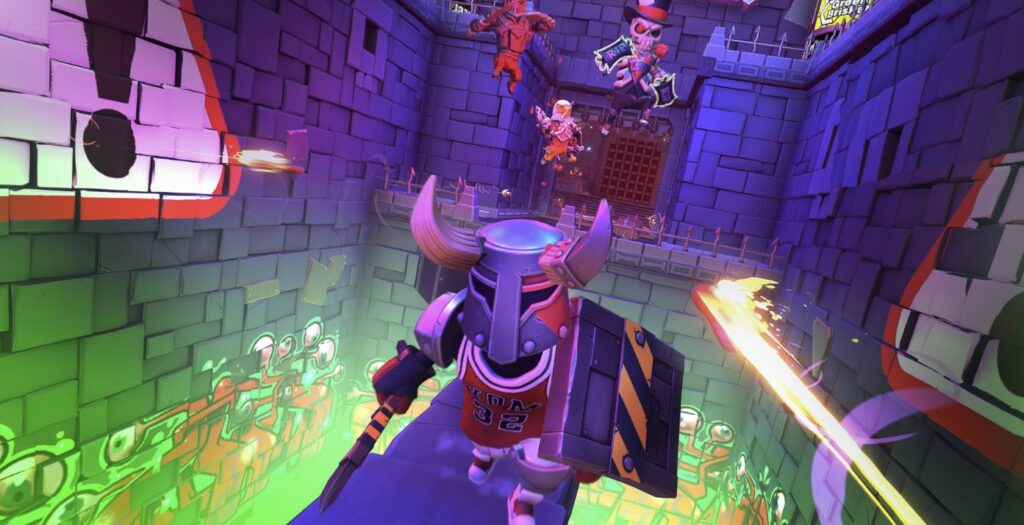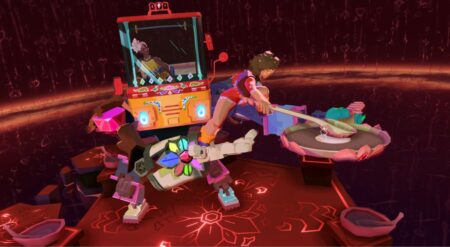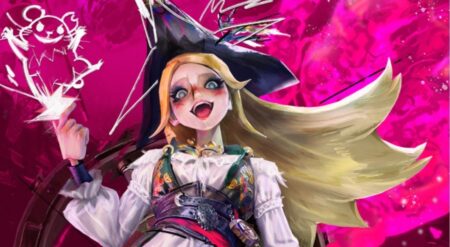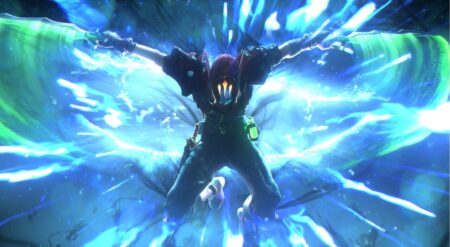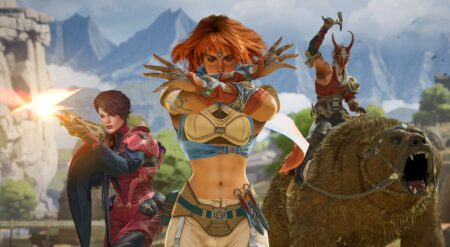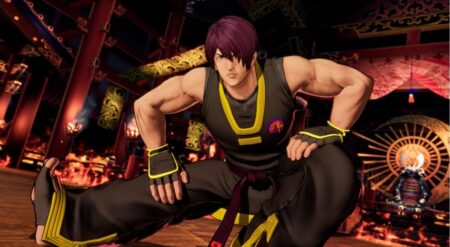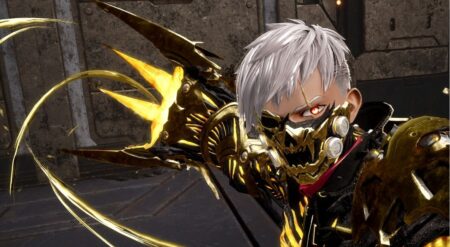It’s always exciting to see publishers announcing new partnerships with games outside the genres they’ve become known for. Amazon Games‘ newest title isn’t an MMO, but it does put the community first. Developed by Glowmade King of Meat, a one to four-player hacking, slashing, co-op combat game with UGC dungeon building. Set in the mystical world of Loregok, players compete on the number one television show, beholden to the crowd they’re entertaining – the titular King of Meat. On it, you’ll see dragons, trolls, skeletons (who have their own union), and, of course, corporate commercialism – where high fantasy tropes meet the kind of comedic takes on capitalism that only media infatuation can bring.
Entirely focused on riding comedy and action, King of Meat does the most to create a full world with corporations, unique characters, and dynamic dungeons, always giving the player opportunities for creativity. We spoke with Glowmade’s Executive Producer Jim Unwin and Creative Director Mike Green about what makes King of Meat unique and funny and how to inspire cooperative competition.
Keeping the audience from becoming overwhelmed in a game that incorporates comedy into environments, animations, and dialogue is vital. With other examples of games becoming unbearable in their balance, King of Meat always feels like it’s hitting the right note. In fact, the humor is its strongest element. When asked about keeping the balance, Executive Producer Jim Unwin had a simple answer: they made a game they wanted to play.
“I think at the core of it, we’ve just made a game that we want to play, and that makes us laugh,” Unwin started, “I didn’t think at any point there’s a single page that described what the game would be. We would very much play it and [pinpoint] ‘this is funny,’ ‘this is not funny,’ ‘we enjoy this,’ or ‘let’s do more of this. It’s been quite an organic process. Then, as the team’s grown, one great thing about this game is that people get it. I’m going to steal one of Mike’s lines here, but we have pitch documents from six, seven years ago, which still describe the game we’ve got, and the game we’ve got now is considerably bigger, but those core ideas, have turned out to be true. So in terms of mechanics and humor, a lot of it is somebody on the team has an idea and then just goes and does it.”
Creative Director Mike Green added, “I think fans of British humor can be quite out there, and it can be uncomfortable humor… I think that’s one of the things I think the humor—and at Lionhead as well—was all born from the team, in the same way. When you’ve got a team that understands what you’re making, it’s much easier to trust them to make decisions. It’s been easy because, you know, very rarely do we have to [guide the direction]. Everyone gets it. There will be something in [King of Meat] that everyone, including some people from Amazon [Games staff], have had some say or involvement.”
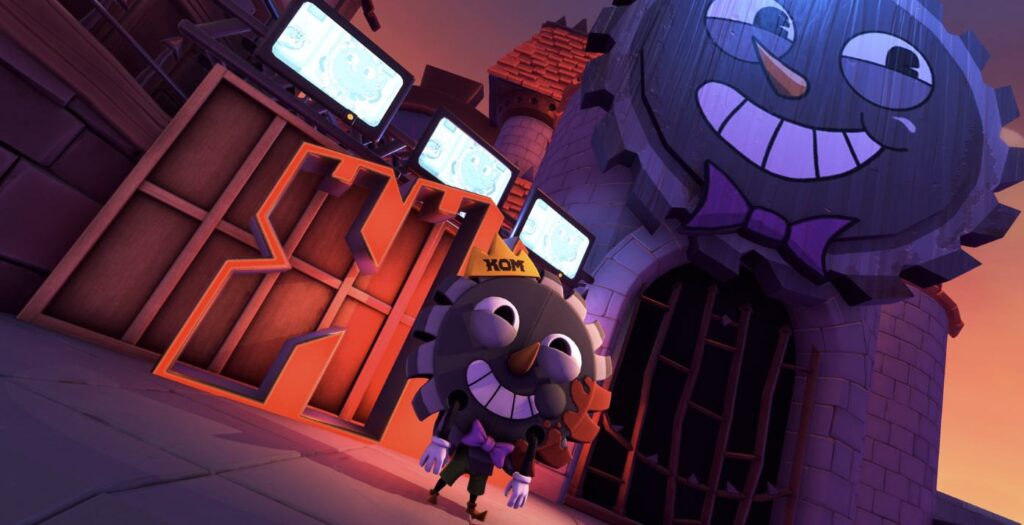
King of Meat’s comedy ranges from advertisements selling “Meat Milk” and “Mom’s Spit Armour Shine” to belching abilities and even a person locked in a mascot suit that you only see by walking behind him. The jokes are everywhere, and those small details effectively build a larger world of dark humor, camp, and absurd chaos that pays off.
When asked to describe their favorite bit of humor, big or small, Green’s answer was about it all. Green said,
“I can’t think of one moment. The game still makes me laugh. I mean, some things happen that I still find funny, which is a good sign. Sometimes it can be the 50th, 100th time I’ve seen this, and I don’t know, I think it still makes me laugh.”
Unwin interjected, “I mean, playing multiplayer with people I see every day of the week and have done for years and years and years, it all still makes me laugh. One detail: I would have chosen the one you just mentioned, [the mascot locked in the suit]. I think that padlock, in many ways, sums up the game’s humor.” To which an excited Green responded, “[The padlocked mascot] is even worse than that because his arms sort of dangle,” he raises his arms to his sides, bending them at the elbows,” he is basically like trapped in a ‘C.’ I mean, I do feel sorry for him.”
The game’s humor also shines in its development of The Corporations You’ll Meet in the World. A chaotically ridiculous cast of characters representing the Corporations are all situated in Ironlaw Plaza, the player hub. There, you interact and buy upgrades for magic, weapons, gear, and more from Regulated Effects, Beast Shall Ride, Golden Anvil, and KOMSTRUCT.
In addition to comedy, co-op is central to King of Meat. While the game will feature a campaign mode, the co-op experience and playing with friends is what we played at the preview, and they are what makes some rudimentary mechanics extremely fun. And that’s by design.
“When we started, one of my touch points was memories of playing Mario Kart on the SNES and that kind of back and forth you would have with people about trying to win—but also trying to spoil it a little bit and laughing as people fail. And, you know, that tension of two people getting to the finish line,” Unwin said, “For me, even though everybody’s going to be playing in separate physical spaces, they’re going to have that [co-operative competition, co-opetition]—it’s a terrible portmanteau—of wanting to work together but still wanting to win.”
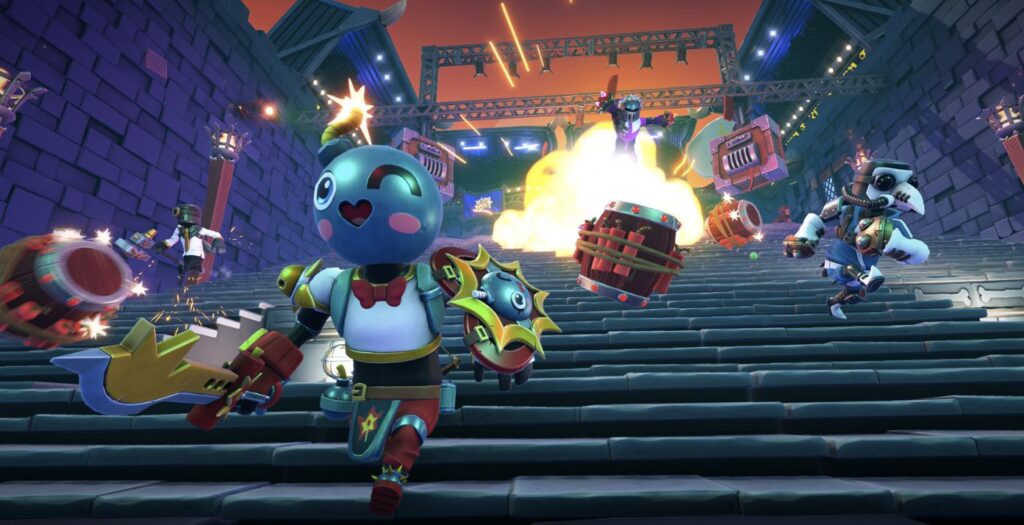
While you can’t deal friendly fire damage to your teammates with your basic attacks, Glory Moves are different. Your special moves that increase damage and deal with large mobs easily can absolutely affect them. As can explosions that you trigger.
For example, the one Glory move we had equipped initially let out a big belch. If you hit enemies, they’d be flung off of platforms and/or damaged. Your teammates? Well, let’s just say I “accidentally” knocked many of them off—and got knocked off myself. This added element of chaos made the condensed halls of the dungeon interesting and every platforming section more dangerous. While some of the combat elements felt stunted, the Glory Moves and the fun they brought to the four-player experience made up for it.
Green added, “One of the other questions from a few days ago was about the games that inspired us.
There isn’t one game, but Mario Kart, Castle Crashers on the Xbox 360, and even Splatoon. I love the hub world and that was a big inspiration for our [hub world]. But I think it’s just having players that can work together and have fun. Yeah, there is light competition but I feel like we’ve got the balance about right… I love the fact that the Glory Moves can be chaotic. You’re going to use your super weapon, and Jim, you’ll pay the price.”
He continued, “We’re trying to make sure the [Glory Moves] have some impact on others. We’re trying to enforce cooperation. So, some moves can give your teammates an advantage. We’ve got another move called Hot Potato, where you can throw an explosive potato with a thong. Or you can pass it between each other, and the potato gets bigger with a bigger explosion. It’s little things like that make it [co-operative competition].”
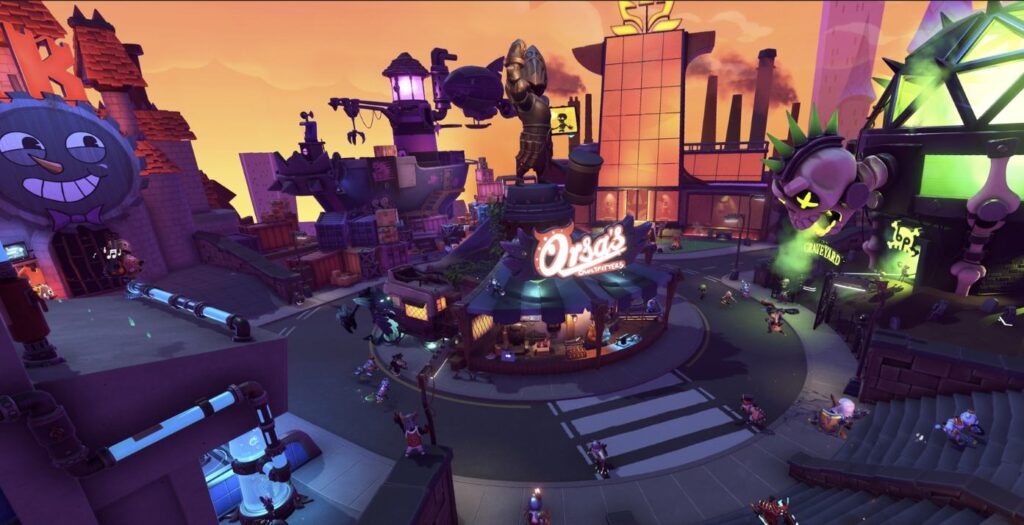
Listening to Green and Unwin explain King of Meat exemplified their studio’s core pillar: Joyful creativity. While this is clearly demonstrated in their development process, it also translates into what they want players to experience when they enter Creator mode, the game’s creative mode, to build their own dungeons. Whether it’s using blueprints or making it from scratch, creating your own dungeons is what King of Meat wants you to engage in. It offers agency to the player to create a dungeon, build it, beat it, and then put it out in the community for others to play, too.
One of the most fascinating things is that the developers created each dungeon using the same tools available to players in the Creator mode. This allows players to use creator pre-sets or start from scratch in the ‘freeform’ mode to build their dungeon masterpieces. That player’s individuality also translates to the characters as well. In King of Meat, creative self-expression is encouraged. The customization suite also contains weapons, attacks, and Glory Moves, which will give you and your teammates the ability to run the dungeons and celebrate your victories in the most chaotic and entertaining ways possible, which factor into how the audience receives them.
While the character customization doesn’t feature super robust elements, you can switch out clothes, helmets, accessories, weapon skins, and emotes. However, the most unique character customization element comes from King of Meat’s decoration element. Here, you can take pins and stickers and apply them anywhere onto your character model. This allows you to create unique versions of gear that only you have. Giving players this kind of agency exemplifies Glowmade’s core value.
“It’s so unique! You’re being creative, and that version of the character, that exact placement of those stickers, the scale of them, and where you put those decorations [is only yours]. No [other player] has anything like that. It is unique to you. Wherever possible in the game, we’ve tried to put those things and let the player customize it and have agency over it,” Green explained.
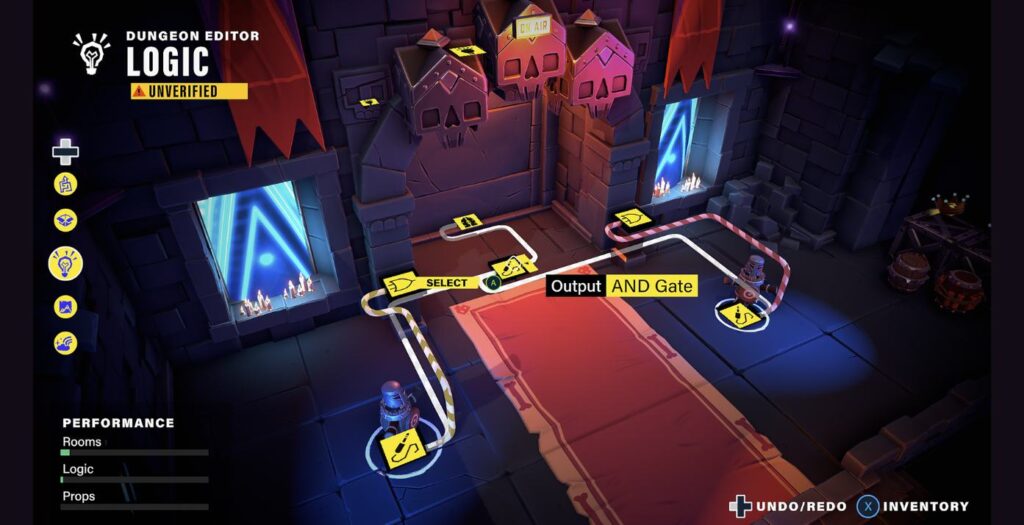
Unwin added, “And we try to design these things in a way where it’s hard to make bad things as well. We want people to feel good about making stuff. I think that, generally, a lot of creative tools are so broad. It’s very easy to look at all of our tools, [from] character customization, which is at one end of the spectrum, to the level design stuff, which gets deep at the other end. All the tools try to nudge you towards making something you can be satisfied with and proud of. [Many] decisions about what you can and can’t do, the kind of granularity the tools are all about making you feel proud. [We want to] get you from having never made something to having created something you’re proud of.
Being able to create in-game is a way for non-developers to take a stab at level design. Having watched my brother, who is now an engineer in game development, fall in love with level design because of Halo 3‘s Forge, the possibility of others coming into game development from level editing is a reality. I wondered if Green and Unwin had thought about it.
“I’d love to hear stories [of that] because that’s why we set up Freeform mode,” Green said, “We want people to make things and realize that you don’t have to be a professional game. It might be their stepping stone for them to do computer science or programming or become an artist. We’ve got a team of amazing level designers, but I’m 100% sure that we’re going to see levels made by someone who maybe sat in their bedroom, and it will be better than what we’ve done. They’ll hit that point, and, you know, maybe that will create a spark. I know Media Molecule employed [developers] who were just building [Little Big Planet] levels. That was their stepping stone into the games industry.”
Unwin ended the interview by saying, “I love the idea that down the line, we’re going to be doing the same thing with these tools, and that’d be wonderful.”
After 90 minutes of playtime, the co-op chaos and comedy that Green and Unwin were on full display. Working our way in a group of four across multiple maps and even surviving the waves of enemies in single-player mode, there was never a dull moment. While some combat is repetitive, the dungeon depth is what kept each match from going stale. Additionally, the thoughtful balancing of impacting your teammates is easily a selling point for anyone with friends to jump in. As we wait for more details and hands-on time with Creator Mode, it’s clear that King of Meat is shaping up to be a joyfully absurd title worth keeping your eyes on.
King of Meat is set to release on PC (Steam), PlayStation 5, Xbox X|S, and Nintendo Switch.

